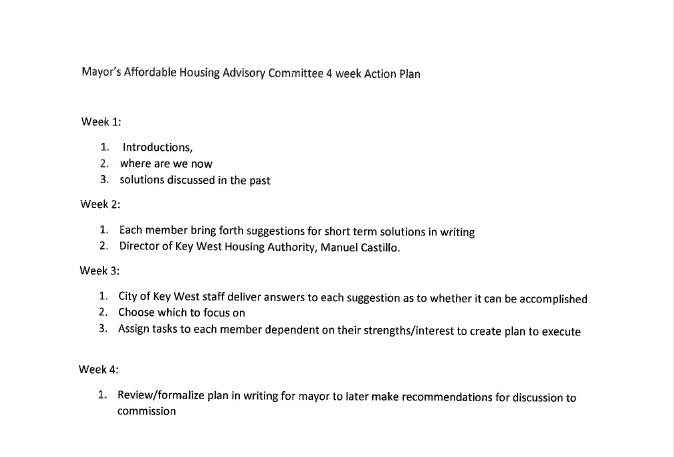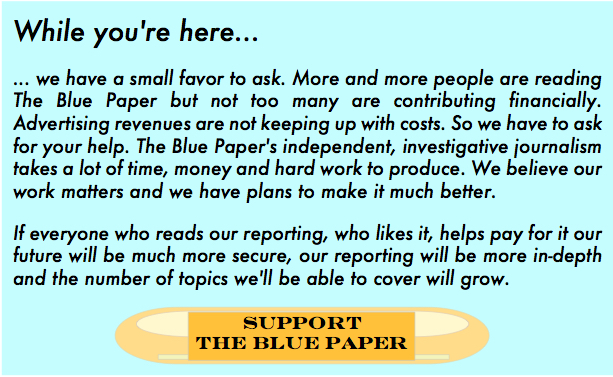Peary Court Sunshine Law Violations?
Taking a look behind the scenes at the ill-fated 55 million dollar Peary Court purchase proposal has opened a door into the shadowy marshland of Key West politics.
An investigation by The Blue Paper reveals possible Sunshine Law violations, officials concealing information from the public, and a blurry line between public office and the interests of private organizations.
Last July during a City Commission meeting, Commissioner Jimmy Weekley announced that he had reached an agreement with the owners of Peary Court: The City could purchase the property for 55 Million dollars.
The announcement received mixed reactions since the Commission had not authorized any negotiations and Peary Court had been sold just two years earlier for 35 million.
Commissioners, aside from Commissioner Weekley, expressed strong reservations. Mayor Craig Cates created an “Affordable Housing Advisory Committee,” and the purchase issue was later scheduled for a March 15th referendum.
In time the public learned that the 55 million dollars would only buy a portion of Peary Court. The deal with the mysterious anonymous owners got murkier but one by one, the members of the Mayor’s Advisory Committee and a majority of the Commissioners changed their views and began to support the purchase.
In 2012, when Peary Court could have been purchased for only 35 Million, Mayor Cates said he didn’t believe the City should be involved in buying residential real estate.
This time around, Commissioner Clayton Lopez said he found the deal “too rich for [his] taste.”
Maureen Bramlage, who later sat on the Mayor’s Advisory Committee, wrote a Letter to the Editor in The Blue Paper condemning the deal.
But they all changed their minds. When trying to understand how that happened, we discovered an opaque process, that arguably violated Florida’s Sunshine Law and the public trust.
We asked to see the Mayor’s Affordable Housing Advisory Committee’s meeting minutes; but there were no minutes. We asked for any work product such as notes, lists of speakers and consultants that had met with the Committee, but that was also denied; we were told the Committee was not subject to the Florida Sunshine Law.
We appealed to the City Attorney, Shawn Smith, who quickly advised City staff that any documents produced or gathered by the Committee ‘s secretary were indeed public records.
Under Florida’s Sunshine Law [Florida Statute Chapter 286] Advisory Committees [even those appointed by one elected official] are generally subject to the Florida Sunshine Law. [See the League of Florida Cities’ memorandum on the subject here.]
The Committee’s mission statement clearly defines it as an “Advisory” Committee that was to make “recommendations” that would later be brought to the City Commission by the Mayor for discussion. As such, it appears the meetings should have been advertised, public attendance allowed, and minutes should have been kept.
The public would then have had the opportunity to know who had appeared before the Committee and what had been said and why the recommendation to buy Peary Court had prevailed as the number one choice. Instead, all meetings were held in private.
After embracing the Peary Court purchase, the Advisory Committee morphed into a Political Action Committee. Some members, who had initially made recommendations to the Mayor, were now members of a PAC headed by Commissioner Weekley, seeking private funds for the PAC’s Peary Court purchase campaign. The PAC ultimately received about $19,800 in contributions. The money was used, for the most part, to purchase campaign promotion materials, for advertising, and to conduct a poll of Key West voters.
When we asked Commissioner Weekley why the poll results had never been published and whether we could see the results now that it was all over, Commissioner Weekly told us the PAC is a private organization that isn’t required to make anything public.
Blue Paper: “As a City Commissioner don’t you believe the public should have as much information as possible?”
Weekley: Well, that poll belongs to the PAC.
Blue Paper: But you were the head of the PAC…
Weekley: And there is nothing wrong with that; many elected officials are also members of PACS.
Monroe County, Marathon, and Islamorada all have formed Affordable Housing Advisory Committees. However, their agendas and meetings are advertised, their meetings are public and they do produce and share their minutes.
While several City Commissioners were publicly pushing for the purchase of Peary Court, The Blue Paper received a tip advising that a party, not named, had offered to purchase Peary Court and deed restrict it “affordable” in exchange for increased density. [Essentially what the City was proposing to do.] We were told that party had even sent a letter to the City and that we should request a copy. This was about 2 weeks prior to the referendum but when we asked for a copy, the City Clerk said no such letter existed in the City’s files.
Keep in mind that PAC members and Commissioners who were promoting the Peary Court purchase were claiming that if the City didn’t purchase the property then surely the existing rental units would be lost via conversion to high-end housing.
Here is the PAC’s FAQ about that [still on the PAC’s website to this day]:
Yet just a few days after voters had responded with a resounding “no” to the purchase referendum, Mayor Cates announced that someone, unnamed, was offering to purchase Peary Court and deed restrict it in exchange for a density bonus. Did Commissioners know about that alternative prior to the referendum? [Commissioner Weekley said he didn’t.] Was that important information about an alternative solution purposefully withheld from the public –together with the poll results, mold inspections, and the very square footage of the property being purchased?
Commentary
Regardless of whether the Mayor’s Affordable Housing Advisory Committee did or did not violate the Sunshine Law, it should operate in the Sunshine. And it should receive public input as to what is considered truly “affordable” in Key West. Obviously, voters do not believe that $2,400 / month for Peary Court apartments qualifies as “affordable”.
Lack of transparency and open debate has led many to believe the City’s “affordable housing plans”, are merely a disguised effort aimed at allowing developers to continue building market rate units dubbed as “affordable housing.”
UPDATE Friday 4/22/16 2:30 pm:
Mayor Cates, has responded to the Sunshine Law issue: “I spoke with the City Attorney,” said the Mayor, “as long as the committee was only a fact finding committee – it didn’t have to operate in the sunshine.”
However, Mayor Cates also said the effort to do something about the housing crisis needs as much input as possible and he plans on organizing public workshop[s] in the near future.







Nothing these bubbas do surprises me anymore. They all feel they are above answering to anyone, least of all the people who live here.
The citizens that pay attention to the details of these kinds of deals, knew Peary Ct was just another bad, costly deal like so many others – the Taj Mahal City Hall and the $20+Million park. Those paying attention like Commission Romero are too often called out by the Mayor and others on the dais for being negative and looking for problems, and ulterior motives in political decisions. Should it not be the primary duty of our elected politicians to determine if these kind of deals benefit the taxpayers and citizens and to ask the tough questions.
There are 3 kinds of people who live here in Key West: one group doesn’t give a rats ass about what goes on politically or with our tax dollars – they are here to work and make money and most do not bother to vote. Another group of bobble heads just nod yes to anything suggested by a few on the dais. And lastly there are a few that questions most everything – because they’ve seen too many deal benefit business and bubbas to the detriment of the tax payer and citizen. Thank God for those with brains and a conscious, unfortunately they are a minority.
Should they wonder why we don’t trust the broken government bureaucracy!
keywestislandgirl, you sure got the three times of people here completely correct and the bubbas love the first two groups.
Surprise! Surprise! Whatever happened…Sunshine laws notwithstanding, the people were not fooled, as evidenced by the defeat at the ballot box. That is what really matters. Makes me both happy and proud.
Citizens must keep memories of these stunts uppermost in their minds…when it comes to electing civic leaders (and pretenders) to office. That is how democracy works…for real.
I suppose what bugged me most was, in the beginning, there was only one city commissioner who wanted the city to buy Peary Court – Jimmy Weekley. The mayor and other 5 city commissioners each expressed strong reservations, yet all of them but Margaret Romero voted to put it out to voter referendum. Now under the city charter, the voters would have had to approve a real estate purchase and financing. But in this case, 6 of the city’s elected officials did not even like the deal Weekley was trying to sell. Yet, as time passed, 6 elected officials became advocates for the deal, Romero stood her ground. The deal had many moving parts and mysteries. There was no financing secured. There was no promised inspection of the units. Nobody knew exactly how much land in Peary Court the city actually would acquire. Or how much the rents actually would be if the city purchased the 157 existing units and the three units which had burned down. It was spaghetti thrown against a wall, hyped as saving “workforce housing” – no, “affordable workforce housing” – which required an annual income of at least $85,000 to pay the $2,400 per month rent, plus the cost of utilities. The referendum promoters’ propaganda rewrote several dictionaries. The purchase price was not negotiated, despite claims to the contrary. The developers’ profit would be much greater than the advertised $20 million. The developers 48 retained building rights, given to the developers by the city, were valued at $17 million by the developers. 48 building rights they got for free, to build what was billed as 48 affordable rental units, but actually market rate. Convoluted and murky do not do the deal justice. It stank to high heaven. It stank so bad that I was only able to conclude somebody was going to make money, who was not supposed to make money. Good luck proving it, though. Now I read of the appointed Peary Court advisory committee operating behind closed doors, and stonewalling public records requests made by the blue paper. Now it stinks even more. Meanwhile, the PAC Jimmy Weeklly started, to smozzle the voters into approving the Peary Court deal, despite a promise to remain active in getting Key West affordable housing, has been rather quiet since the referendum went down. Who knows what will become of Peary Court? If the city put its new homeless shelter across the street, on the old city transit bus land, that would discourage anybody doing anything different with Peary Court.
Thanks, Blue Paper, for following up on this. When the BOCC finally takes action on the affordable housing issue, it’s likely to be in a similar, wasteful, self-dealing way. The more the Blue Paper can bring to light, the better. Information is power.
Why would a city that covers up MURDER concern itself with the sunshine law ?
Nothing short of the feds coming to KW and doing a total investigation of all offices of KW will change anything. Just maybe what should happen on this magical date is to once again declare war on the USA and succeed from the union. Seems they have no regard to the laws of the USA or Florida so maybe time to become its own country.
What I do see is that if Monroe county takes over KW as abolished it as a city that it will no longer be a party town as it is today. Really would not be all that hard to save KW.
It would require most to resign offices. That starts with the mayor and chief of police. And we all know certain officers should either resign or be fired. Lee for the most part is running a great party town but he dropped the ball on a few cases. Nothing that I see would stop him from firing the thugs that helped killed mr Eimers. It all starts by fixing what you can and improve the image of KW. Right now KW is viewed as a corrupted town.
If willing I think we all know who should be the mayor. NAJA has my vote .
Right now KW is CORRECTLY viewed as a corrupted town.
A comment above about the Affordable Housing PAC not doing much after the Peary Court referendum:
Recent news that the DoD wants to maybe locate Triton drones to here with 400 new personnel , and their families. So where are they going to live? Peary Court maybe? Will they displace those there now or just have the effect city wide of displaying others across the board?
The PAC should step up to the plate on this – with public meetings of course.
DoD would simply build what they need without all of the red tape it takes KW.
But it will create a need for more outside workers and it is them that would have the problem. If KW got off its a– and started building new affordable housing on ground it owns now the problem would go away real fast. It is held up only because they have not found a way to skim some money from it. Even corrupt towns have to find loopholes and under the table deals.
I got this from your Facebook page as published on goodmorningkeywest.com and think it’s relevant to post here that these are your comments to Attorney Cintrons conspiracy criticism:
Hello Robert Cintron. You are a highly-respected local attorney and we value your opinion. Can you clarify whether by your comment here you mean that, in your opinion, the Sunshine Law did not apply to the situation or that respecting the Sunshine Law is not important? Here are the facts, as we know them, that pertain to the Advisory Committee: Mayor Cates created an “Affordable Housing Advisory Committee”, a few weeks later he informed the City Commission that he had set up an Affordable Housing Advisory Committee that would be providing information in the future. One of the very first documents created by the Mayor’s committee was a description of the work the Committee would be doing. [Shown in our article.] That document states that the committee planned to make recommendations that the Mayor would later discuss with the City Commission. Now, in our article we do not claim to have the definitive answer to the legal question, but it is our understanding that when the work of an advisory committee [even one set up by only one elected official] is meant to become a part of the decision making process it must abide by Florida’s Sunshine Law. Is that incorrect? Now, Mayor Cates says that he never actually shared the work of the Committee with the Commission. We could be wrong, but surely, the decision about whether an advisory committee must abide by the Sunshine Law can not be something that is determined after all of the meetings have been held behind closed doors?